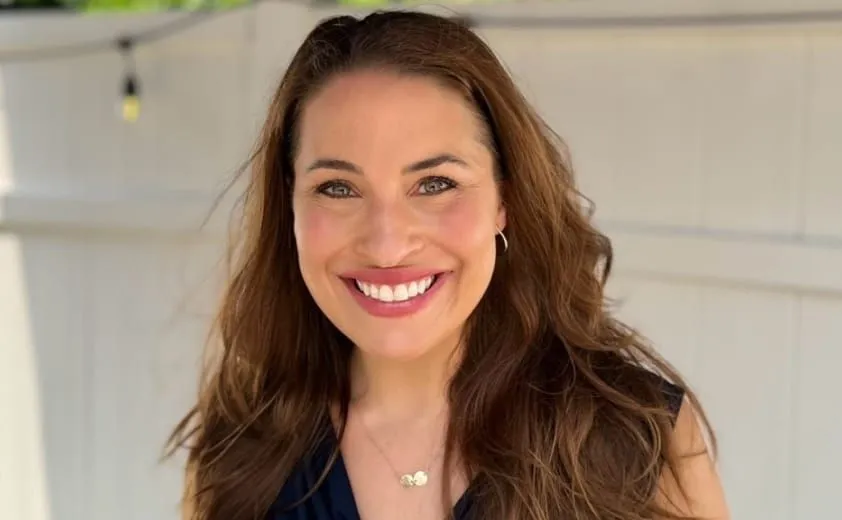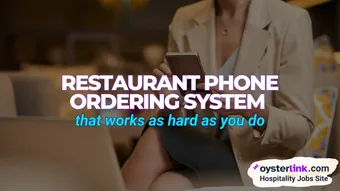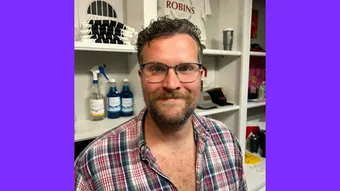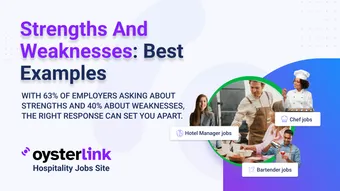Who is Emily LaRuffa?
Emily LaRuffa is a dynamic hospitality professional with over 20 years of experience across the bar, restaurant, and hotel industries. Known for her passion for driving positive change, Emily believes that meaningful transformations create a ripple effect—empowering teams, strengthening businesses, and elevating guest experiences.
As a Restaurant Consultant she is committed to fostering sustainable growth led her to establish Oracle Hospitality Consultants, a firm dedicated to helping restaurateurs thrive. Oracle Hospitality offers tailored solutions to boost profitability, streamline prime costs, attract and retain top talent, and conduct sustainable leadership training.
From Bartender to Restaurant Consultant: The story of Emily LaRuffa
Emily’s journey in hospitality began like that of many young adults in NYC - working to pay the bills while pursuing a career in dance. She started as a bartender and spent years exploring various front-of-house roles, gaining firsthand experience in the industry.
Curious about leadership, Emily dipped her toes into management—and discovered she loved it. Over ten years ago, she fully transitioned into leadership roles, where she honed her skills managing teams, driving revenue and profit, and fine-tuning processes. After nearly two decades in the field, Emily realized her expertise could benefit more than just one establishment at a time. That realization became the spark behind Oracle Hospitality Consultants, her consulting firm designed to help businesses thrive through practical strategies and expert insights.
We sat down with Emily to discuss the keys to operational success and what it takes to build a rewarding career in hospitality. Whether you’re a seasoned restaurant owner or just getting started as a Dishwasher, this interview offers something for everyone.
How to attract young people to start working in the hospitality industry?
Emily: My first approach is getting to know where a person is at. Understanding the motivation and goals of every person can help us guide them towards a career path in hospitality.
A lot of people end up in hospitality to pay the bills but end up loving it. The important part is to showcase a potential career path to them, show them they don’t have to stay in a Server role for a long period of time.
Some of the best managers I have worked with have an art background. We need to allow everyone’s personality to shine through.
If you have a person that doesn’t necessarily know what they want to do in their life, you should show them how life can look like in case they decide to pursue a hospitality career.
People can quickly grow from the hourly positions to become captains, Sommeliers and earn incredibly well. From there they can go into management and build on that.
Every leader needs to understand the goals of the person in front of them, where they want to be. As a leader, you need to ask: What do you want to do? Do you want to be facing customers? Are operations making you happy?
What are the most important skills you look for on a hospitality employee's resume?
Emily: It is essential to mention that everything in hospitality is a transferable skill. This often gets overlooked but I believe that it should be kept on top of our minds at all times.
One of the most important things to me is the willingness to learn. Effective communication plays a huge role. A big part of it is listening and knowing how to read a room.
This is a stressful industry so you must learn how to communicate with team members, managers and guests.
You also need to learn to stand up for yourself and voice your opinion, especially if you want to explore leadership positions.
How to recognize a good employee during an interview?
Emily: I approach things in a different way. The most important thing for me is to turnover the resume and observe the person that is in front of me.
More often than we like to admit, if someone is coming with all these crazy experiences they come with a know-it-all attitude. When you decide to hire exceptionally experienced people chances are they will have a mentality of my way or the highway. Be very mindful about this.
I usually start my interviews by asking the person in front of me to tell me about themselves, now don’t confuse this question with a question about work history. The goal is getting to know the person, not their work history, but who they are as a person, what drives and motivates them.
If you want candidates to shine during an interview, don’t put a lot of pressure on them. Make the interview as conversational and relaxed as possible.
The trick to understanding if a person is a good fit for your team is asking a situational question. As a hiring manager you are familiar with usual scenarios that happen.
Ask the candidate how they would react in a situation. Based on their answer you will be able to determine if the person can be a good fit for the team or not.
Don’t search for a perfect answer, just a person who aligns with your team’s values, everything else can be trained.
The biggest red flag during an interview and immediate no on my end is the following statement: Oh, I wouldn’t do that, that is not my job.
Teamwork is essential for any hospitality position, so if you have a person who just wants to yell at others and boss people around, spare yourself the pain and skip the hire.
How can female leaders succeed in a dominantly male industry?
Emily: As a female, we always have to keep in mind that there are these stigmas of different perceptions of something you as a female and your male colleague says. A lot of times the exact same message will be received differently.
First you must let go of the idea that your voice is invaluable.
If you want to succeed as a leader especially a female leader, you must master the way you voice your opinion. You can’t raise your voice at people or go around assuming people will know what you think and want. This behavior will completely hold you back in your career.
As a leader you must lay out your expectations. If you do so, you can hold everyone accountable for their actions.
Be clear and transparent at all times.
What were your tricks to get more tips?
Emily: This might seem disconnected at first, but the most important thing in increasing your tips is having an open mind to learning. The desire for constant knowledge and soaking everything up.
If you are a back server and would like to learn more about the menu to be able to sell it, don’t think oh I am not in that role yet. Start asking questions, get more knowledgeable and the opportunities will present themselves. More often than you know your leadership is observing you.
If you are starting out, you want to earn more, and you want to grow, you must voice it! State where you want to be going, so that your leadership team can help you guide you there.
Even if you are not a revenue driver, you can still get more tips. How? A lot of establishments operate with tip pools. If you are contributing to a better guest experience and helping your colleagues, you won’t be left out.
Another great way to get more tips is upselling. This one might be challenging when you are starting out, but there is a simple way to deal with the lack of knowledge. Be transparent with the customer, tell them I am not sure but let me check that for you.
The happier your customers are the more often they will return, and this will lead to a higher amount of money in your pocket. The guests want to know that they are being cared for.
A bonus tip is: Learn how to read body language!
Sometimes guests just want to be left alone, don’t disturb them. On other occasions they need that extra attention, give it to them. These are all small ways to increase your income.
How to keep physical health?
Emily: The first step to maintaining good physical health is voicing what you need.
This industry is extremely draining, with long 80–90-hour weeks. You can easily hurt yourself in almost any position. So, to be able to be in the game in the long run you must speak up for yourself and let the management know that you won’t be able to take double shifts.
If you want to work in this industry you need to observe the work-life balance from the top down. I
If your manager doesn’t have a balance, chances are you won’t also.
When you are looking for a job ask questions, don’t be hesitant. In most situations the leadership is aware that everyone is after work-life balance nowadays and not just money.
Ask questions, observe the culture, find time for yourself. Go to the gym, do some yoga, hang out with friends and family, don’t fall for substance abuse and you will be able to maintain good health.
What are the biggest problems restaurants are facing nowadays?
Emily: I don't want to be a broken record, but it’s not being transparent and a lack of communication. I have seen a lot of establishments that don’t lay out the expectations for each role.
Even in this we need to take a look from the top down. If your leaders don’t know what your job will be, you won’t know, and you will get burned out in no time.
I have walked into restaurants asking them to see their job descriptions and their reaction was what job descriptions what do we need that for? Can you imagine that? Not having clear responsibilities and key performance indicators?
Most of these establishments don’t have opening and closing checklists which often means there is no structure in the company.
The excuse that I have heard the most often is we didn’t have time to set up job descriptions and checklists. Many restaurants and bars get stuck in the grind instead of building a strong foundation.
If you want your restaurant, bar, coffee shop to be successful you need to have clear goals and honest job descriptions.
Being a Restaurant Consultant I set a solid structure up. I manage the expectations, goals, job descriptions and this eliminates unnecessary micromanagement. I help them set up and refine their policies and standard operating procedures.
Everything needs to be crystal clear if you want to set yourself up for success.
How can restaurants stay profitable with increasing labor cost?
Emily: This is a layered question with many possible answers, but I will try to give some general recommendations.
A lot of establishments forget about their P&L statement. That is one of the first things I look at when it comes to establishments that are struggling with profitability.
I tell them to focus on prime cost, things that are in their control. What is the top line revenue? How often do you measure performance and what do you consider success?
Another important part when it comes to profitability is being transparent about the P&L with your managers. If you keep the books away from them even with knowledge and experience, they won’t be able to help and run the business smoothly.
As an operator you need to train your management on how the average check looks like, what the turn time is, what the average amount is, what the menu pricing breaks down into.
Once you have all of these covered, we can search for areas of improvement and cost cutting. We can highlight the low hanging fruit and address changes immediately while preparing for the bigger changes that will ensure profitability.
A lot of times, a slight change within a recipe really makes a difference. A change of what ingredients are from one provider to another can make a financial difference. The hard part is being able to stay on top of all of this.
If you are struggling with any aspects in your establishment, the friendliest advice I can give is hire a professional to help put.
What is the one thing you wish you knew before you joined the hospitality industry?
Emily: I wish I knew what opportunities were out there for me. When I started out, I didn’t seem to recognize them.
If I knew there was a career path here for me, I would have embraced it in a different way and with more pride. Instead of saying oh, I am just a bartender, I would say it proudly.
That is the one thing I believe a lot of people fail to see in this industry. We don’t see a career we might love initially, and we don’t take pride in what we do. Hospitality can take your place and build you up like no other industry.
Being a part of this industry means changing the world one customer experience at a time.
There is a career path for everyone who wants to be a part of this world. With all the available resources you can start building a career from day one.
There is a career path for everyone in the hospitality industry
Whether you are a seasoned professional or you are just starting out, remember there is a career path hidden in plain sight.
Yes, this industry can be overwhelming at times, but with the available resources, speaking out for yourself and setting clear expectations you can build a stable and healthy career path.
If you are seeking a little bit more professional inspiration, check out celebrity interviews or get all the necessary information from OysterLink’s career guides.






Loading comments...